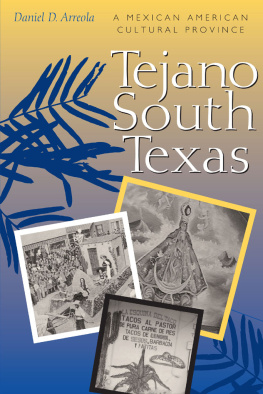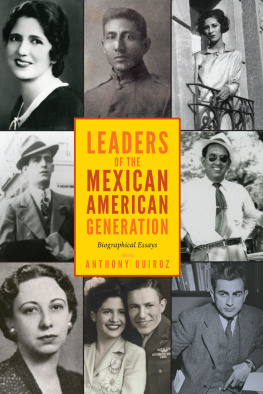
GEORGE I. SNCHEZ
THE LAMAR SERIES IN WESTERN HISTORY
The Lamar Series in Western History includes scholarly books of general public interest that enhance the understanding of human affairs in the American West and contribute to a wider understanding of the Wests significance in the political, social, and cultural life of America. Comprising works of the highest quality, the series aims to increase the range and vitality of Western American history, focusing on frontier places and people, Indian and ethnic communities, the urban West and the environment, and the art and illustrated history of the American West.
Editorial Board
HOWARD R. LAMAR, Sterling Professor of History Emeritus,
Past President of Yale University
WILLIAM J. CRONON, University of WisconsinMadison
PHILIP J. DELORIA, University of Michigan
JOHN MACK FARAGHER, Yale University
JAY GITLIN, Yale University
GEORGE A. MILES, Beinecke Library, Yale University
MARTHA A. SANDWEISS, Princeton University
VIRGINIA J. SCHARFF, University of New Mexico
ROBERT M. UTLEY, Former Chief Historian, National Park Service
Recent Titles
George I. Snchez: The Long Fight for Mexican American
Integration, by Carlos Kevin Blanton
The Yaquis and the Empire: Violence, Spanish Imperial Power, and Native
Resilience in Colonial Mexico, by Raphael Brewster Folsom
Gathering Together: The Shawnee People through
Diaspora and Nationhood, 16001870, by Sami Lakomki
Natures Noblemen: Transatlantic Masculinities and
the Nineteenth-Century American West, by Monica Rico
Rush to Gold: The French and the California Gold Rush,
18481854, by Malcolm J. Rohrbough
Sun Chief: The Autobiography of a Hopi Indian,
by Don C. Talayesva, edited by Leo Simmons, Second Edition
Before L.A.: Race, Space, and Municipal Power in
Los Angeles, 17811894, by David Samuel Torres-Rouff
Geronimo, by Robert M. Utley
Forthcoming Titles
American Genocide: The California Indian Catastrophe,
18461873, by Benjamin Madley
The Cherokee Diaspora, by Gregory Smithers
Ned Kelly and Billy the Kid, by Robert Utley
GEORGE I. SNCHEZ

The Long Fight for
Mexican American Integration

Carlos Kevin Blanton

Published with assistance of the foundation established in memory of
Philip Hamilton McMillan of the Class of 1894, Yale College.
Copyright 2014 by Yale University.
All rights reserved.
This book may not be reproduced, in whole or in part, including illustrations,
in any form (beyond that copying permitted by Sections 107 and 108
of the U.S. Copyright Law and except by reviewers for the public press),
without written permission from the publishers.
Yale University Press books may be purchased in quantity for educational,
business, or promotional use. For information, please e-mail sales.press@yale.edu
(U.S. office) or sales@yaleup.co.uk (U.K. office).
Set in Postscript Electra and Trajan type by Westchester Book Group.
Printed in the United States of America.
Library of Congress Cataloging-in-Publication Data
Blanton, Carlos Kevin, 1970. George I. Snchez : the long fight for Mexican American
integration / Carlos Kevin Blanton.
pages cm(The Lamar series in Western history)
Includes bibliographical references and index.
ISBN 978-0-300-19032-8 (hardback)
1. Snchez, George Isidore, 19061972. 2. Mexican AmericansBiography.
3. IntellectualsUnited StatesBiography. 4. Social reformersUnited States
Biography. 5. Political activistsUnited StatesBiography. 6. Educators
TexasBiography. 7. Mexican AmericansCivil rightsSouthwest,
NewHistory20th century. 8. Mexican AmericansSegregation
Southwest, NewHistory20th century. 9. Education, Bilingual
Southwest, NewHistory20th century. 10. Southwest,
NewRace relationsHistory20th century. I. Title.
E184.M5B555 2015
970.92dc23
[B]
2014018632
A catalogue record for this book is available from the British Library.
This paper meets the requirements of ANSI/NISO Z39.48-1992 (Permanence of Paper).
10 9 8 7 6 5 4 3 2 1
Dedicated with love to Kristine

CONTENTS

PREFACE
Nearly twenty years ago I began a dissertation on the history of bilingual education in the United States. Among the most useful secondary sources on this topic were decades-old works by George I. Snchez of the University of Texas, a figure with whom I was only slightly familiar. Though he had been dead since I was a toddler, Snchezs writings from the 1930s through the 1960s crackled with sharp insight into the complex issues I attempted to fathom. Though most historical actors in this dissertation and later in a monograph were confined to a chapter or two, Snchez was a transgressive force who, had I allowed it, could have haunted the pages of every chapter. My publications from that project in some way address issues Snchez first raised decades ago and that I further explore in this book.
But this background only partially explains my connection to the project. After receiving my doctorate at Rice University in 1999, I gratefully accepted a tenure-track position with the Chicano/Latino Studies program at Portland State University. In the fall of 1999, my first term as a full-time professor, I experienced an epiphany in my Chicano studies introductory class. In my lecture on pre-Chicano leaders Snchez completely took over most of the class. The good professor had once again monopolized my energies quite against my will. As I lamented Snchezs unanticipated prominence in the lecture, a freshman asked an innocent question that momentarily stunned me with possibilities: if you know all this about Snchez and if hes as important as you say, why dont you write a book about him? I recall stammering out some nonreply, a thinly disguised cover for the sparks going off within. I had never thought of taking on such a research project and ruminated on it for the next few years. Since that moment I have obtained a new job, published a book and several articles, found myself promoted to associate professor with tenure, and, not least, have started a family. In all that time this project has been a part of my life. The conclusion of a long, consuming project like this creates ambivalencefeelings of pride, joy, exhaustion, reticence, and relief unevenly mingle. Yet, having to briefly summarize these years is, without a doubt, a joyless exercise. It feels like cheating the pages to come. So I will be brief here. In a sentence, George I. Snchez of the University of Texas is the single most important Mexican American intellectual between the Great Depression and the Great Society.
Next page







